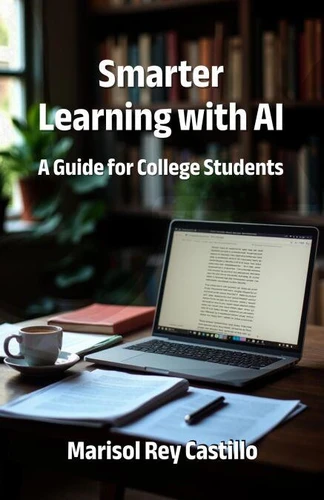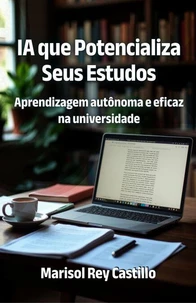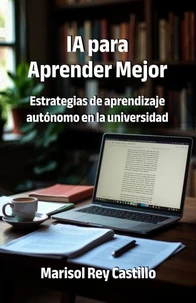Smarter Learning with AI. A Guide for College Students
Par :Formats :
Disponible dans votre compte client Decitre ou Furet du Nord dès validation de votre commande. Le format ePub protégé est :
- Compatible avec une lecture sur My Vivlio (smartphone, tablette, ordinateur)
- Compatible avec une lecture sur liseuses Vivlio
- Pour les liseuses autres que Vivlio, vous devez utiliser le logiciel Adobe Digital Edition. Non compatible avec la lecture sur les liseuses Kindle, Remarkable et Sony
- Non compatible avec un achat hors France métropolitaine
 , qui est-ce ?
, qui est-ce ?Notre partenaire de plateforme de lecture numérique où vous retrouverez l'ensemble de vos ebooks gratuitement
Pour en savoir plus sur nos ebooks, consultez notre aide en ligne ici
- FormatePub
- ISBN8231440795
- EAN9798231440795
- Date de parution29/07/2025
- Protection num.Adobe DRM
- Infos supplémentairesepub
- ÉditeurWalzone Press
Résumé
Learning with artificial intelligence is not cheating, it is learning better. Discover how to use it to study independently, think critically, and develop skills that enhance your mind rather than replace it. What if learning with artificial intelligence were not about cheating, but about learning better?That is the question at the heart of this book. In a context where AI is rapidly becoming part of university life, this work invites readers to view it not as a shortcut, but as a strategic ally for strengthening autonomy, critical thinking, and depth of study.
Primarily aimed at college students, though also valuable for educators, this book offers a theoretical and practical guide to using digital tools ethically, effectively, and with clear educational purpose. It is not a technical manual, but rather a proposal that blends educational foundations with real-life applications of AI in processes such as active reading, reflective writing, knowledge organization, metacognition, and time management.
In response to the risk of passive dependence on technology, this book proposes a mindful approach: learning with AI without giving up one's own judgment. Artificial intelligence does not replace the student, it enhances their abilities when used with intention and discernment. Readers will find concrete examples and suggested resources to enrich their learning experience, organize their digital environment, and maintain long-term motivation.
The focus is clear: to use AI as a tool that supports the development of cognitive strategies, not as a substitute for intellectual effort. Rather than offering final answers, this book raises thoughtful questions about how we learn today. It is an invitation to study with discernment, think with tools, and build knowledge without giving up autonomy.
Primarily aimed at college students, though also valuable for educators, this book offers a theoretical and practical guide to using digital tools ethically, effectively, and with clear educational purpose. It is not a technical manual, but rather a proposal that blends educational foundations with real-life applications of AI in processes such as active reading, reflective writing, knowledge organization, metacognition, and time management.
In response to the risk of passive dependence on technology, this book proposes a mindful approach: learning with AI without giving up one's own judgment. Artificial intelligence does not replace the student, it enhances their abilities when used with intention and discernment. Readers will find concrete examples and suggested resources to enrich their learning experience, organize their digital environment, and maintain long-term motivation.
The focus is clear: to use AI as a tool that supports the development of cognitive strategies, not as a substitute for intellectual effort. Rather than offering final answers, this book raises thoughtful questions about how we learn today. It is an invitation to study with discernment, think with tools, and build knowledge without giving up autonomy.
Learning with artificial intelligence is not cheating, it is learning better. Discover how to use it to study independently, think critically, and develop skills that enhance your mind rather than replace it. What if learning with artificial intelligence were not about cheating, but about learning better?That is the question at the heart of this book. In a context where AI is rapidly becoming part of university life, this work invites readers to view it not as a shortcut, but as a strategic ally for strengthening autonomy, critical thinking, and depth of study.
Primarily aimed at college students, though also valuable for educators, this book offers a theoretical and practical guide to using digital tools ethically, effectively, and with clear educational purpose. It is not a technical manual, but rather a proposal that blends educational foundations with real-life applications of AI in processes such as active reading, reflective writing, knowledge organization, metacognition, and time management.
In response to the risk of passive dependence on technology, this book proposes a mindful approach: learning with AI without giving up one's own judgment. Artificial intelligence does not replace the student, it enhances their abilities when used with intention and discernment. Readers will find concrete examples and suggested resources to enrich their learning experience, organize their digital environment, and maintain long-term motivation.
The focus is clear: to use AI as a tool that supports the development of cognitive strategies, not as a substitute for intellectual effort. Rather than offering final answers, this book raises thoughtful questions about how we learn today. It is an invitation to study with discernment, think with tools, and build knowledge without giving up autonomy.
Primarily aimed at college students, though also valuable for educators, this book offers a theoretical and practical guide to using digital tools ethically, effectively, and with clear educational purpose. It is not a technical manual, but rather a proposal that blends educational foundations with real-life applications of AI in processes such as active reading, reflective writing, knowledge organization, metacognition, and time management.
In response to the risk of passive dependence on technology, this book proposes a mindful approach: learning with AI without giving up one's own judgment. Artificial intelligence does not replace the student, it enhances their abilities when used with intention and discernment. Readers will find concrete examples and suggested resources to enrich their learning experience, organize their digital environment, and maintain long-term motivation.
The focus is clear: to use AI as a tool that supports the development of cognitive strategies, not as a substitute for intellectual effort. Rather than offering final answers, this book raises thoughtful questions about how we learn today. It is an invitation to study with discernment, think with tools, and build knowledge without giving up autonomy.






